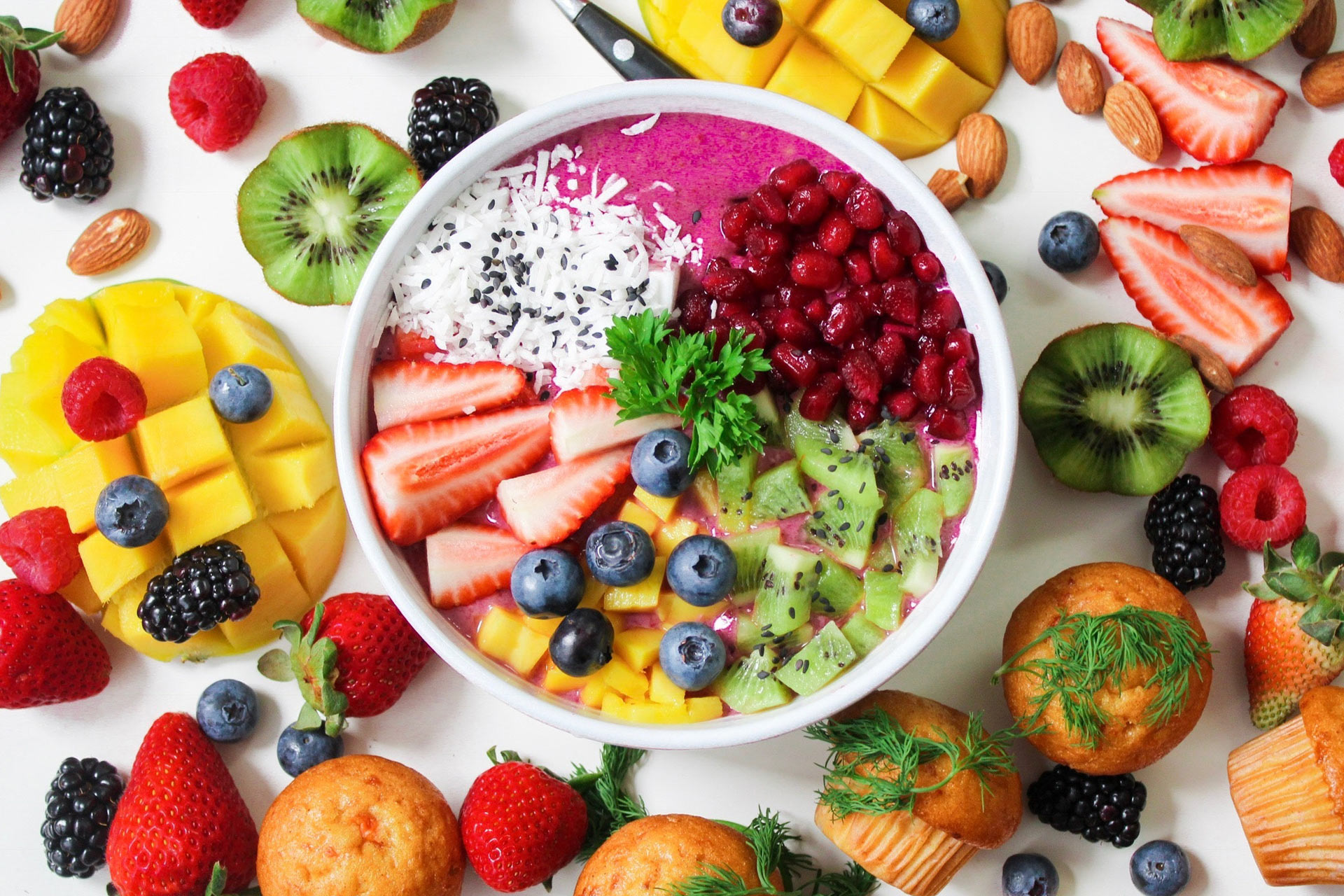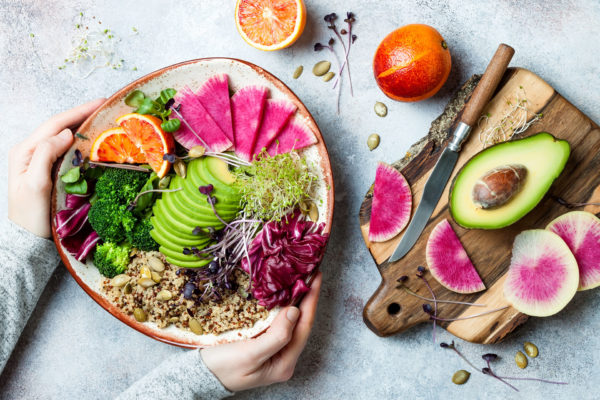Your Top Nutrition Questions, Answered
By
3 years ago
An expert shares some simple ways to improve your nutrition

The world of nutrition can be confusing. With new fads popping up left right and centre, it can be tempting to follow the latest trends – but really, a lot of health comes down to the basics. How can we create a balanced plate? How much fruit and veg should we be eating? And when should we be eating our meals? Here, we’ve enlisted the help of integrative nutrition coach Paola Langella, who also founded online wellness platform Shapes, to help answer some of the big questions.
Your Top Nutrition Questions, Answered
How important are the timings of our meals?
Having a structure is extremely important for different reasons. When we have a structure we can efficiently balance our nutrients during the day, without hunger dictating our choices. Respecting the timings of meals can help us to have a calmer and more organised life. If we forget to eat, or if we skip meals, we can suffer from mood swings, low energy and an imbalance in our hormones. I always say to my clients: ‘respect your meal timings like you are on a date with yourself’. Respecting meal timing is a form of self love for yourself and for your body.
My simple tips:
- Don’t skip breakfast: it is the most important meal of the day. You will feel less hungry and more energetic throughout the day if you begin with a good balanced breakfast.
- Have two snacks during the day, one mid-morning and one mid-afternoon.
- Spend at least 30 minutes for your lunch; do not rush. Do not eat while walking, standing, or working. Try to focus on your food and feel nourished when you eat, and avoid checking devices or speaking on the phone during this time.
- Have dinner at least two hours before you go to sleep.
What does a balanced plate look like?
A balanced plate is a plate that contains everything that the body needs, respecting portions. It should include:
- Healthy grains, such as brown rice, quinoa, buckwheat, seeded bread, whole grain pasta, amaranth, couscous.
- Proteins (plant-based or animal), like beans, lentils, chicken, turkey, fish, eggs, light cheese.
- A mix of colourful vegetables: eating seasonal is always better as the vegetables are packed with more nutrients.
- Healthy fats, like extra virgin olive oil, nuts, seeds, avocado.
All these macronutrients give different benefits to our body. If any of these are missing on your plate, your body cannot function at its optimal best – you can face random cravings, or headaches and fatigue. Remember that your lifestyle is essential to keep harmony in your plate: if you have a disorder in your lifestyle, your plate cannot be in balance.
My recommendation is to first of all check what’s not working right now in your lifestyle. Is it your home environment, lack of time, exercise routine, relationships? If you start to approach your balanced plate from a holistic perspective, you can solve the problem at its root, and everything will unfold easier. You will have the calm and the time you need to be more mindful about your food choices.
Can you eat too much fruit?
Fruit contains natural sugar and is packed with vitamins, minerals, antioxidants, and fibre, which is different to other food where sugar is added, such as apple juice, cakes and soda drinks. The source of sugar we are eating is really important – when we eat natural sugar that comes from whole foods like fruit and vegetables, the body can digest them slowly, without causing a significant rise in blood glucose.
Having said that, the truth is that excess sugar in the diet, regardless of the source, may negatively impact health over time. Therefore my suggestion is: moderation is the key – try to include four to five portions of fruit per day. To avoid a blood sugar spike, try to combine fruit with some healthy fat, like a handful of nuts, nut butter or dark chocolate above 85 percent.
What are some easy ways to create healthy habits in our lives?
Everyone is different therefore we need to understand what can be achievable for us right now – but here are some ideas.
- Practice gratitude as a positive mindset shift: every morning write down three things you are grateful for and why you are.
- Aim to exercise twice to three times a week; a walk outdoors counts.
- Cook at least one meal per day at home.
- Engage in relationships that make you feel good and nourished.
How much water should we be drinking each day?
You should aim to drink at least 2L of water per day, but this can vary if you are a very active person, or you do intense physical activities. To integrate more water in your lifestyle, start drinking one or two glasses of water every morning on an empty stomach as soon as you wake up. Also, your body will crave more water during the day as you will feel when it’s dehydrated. Try to drink a good glass of water before your cup of coffee and before your meal. And aim to drink the majority of the water in the first part of the day so during the night, your sleep won’t be interrupted.
Is organic food better for us?
I always say to my clients that it is always better to eat fruit and vegetables regardless of how they are grown rather than not eat them at all. The nutrients in organic and conventional food are the same, but when we choose organic food, we get more antioxidants from this food compared to conventional produce. There are also more pesticides in conventional food, therefore more toxins in our body that can cause inflammation.
What are some easy ways to cut our sugar intake?
- The most important one is to eat a balanced plate with all your macronutrients to prevent cravings.
- Start your day with a savoury breakfast. You can see simple ideas in my book or on my Instagram.
- Use herbs and spices, like cinnamon, ginger and turmeric that can fight sweet cravings and sweet vegetables like butternut squash, carrots, sweet potatoes and parsnips.
- Drink lots of water during the day. Sugar cravings can be caused by dehydration.
- Read the labels of canned soups, cereals, proteins bars, canned beans and sauces – they are often packed with sweeteners and other artificial sugars.
- Buy a dark chocolate above 80 percent to have in your cupboard. Chocolate is a superfood: you want to aim for the darkest one in order to have its antioxidant benefits and to cut the sugar.
- Adjust your sleep routine. Try to have seven or eight hours sleep every day, avoid watching TV right before going to sleep, and as difficult as it seems, try to avoid using your phone or other electronic devices in the 30 minutes prior to going to sleep. When we don’t sleep enough we can feel hungrier and we crave for more sugar to keep energy levels up or deal with tiredness-induced stress.























